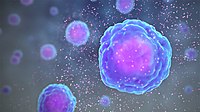
BIOM-27. PREDICTIVE EVALUATION OF QUANTITATIVE SPATIAL PROFILING OF THE TUMOR MICROENVIRONMENT BY MULTIPLEX IMMUNOFLUORESCENCE IN RECURRENT GLIOBLASTOMA TREATED WITH PD-1 INHIBITORS
Sign Up to like & getrecommendations! Published in 2020 at "Neuro-oncology"
DOI: 10.1093/neuonc/noaa215.027
Abstract: PD-1 inhibitors have shown limited efficacy in glioblastoma (GBM) due to microenvironment immunosuppression and low tumor mutational burden. In GBM, PD-L1 expression is not a predictive marker for response to PD-1 or PD-L1 inhibitors. Multiplex… read more here.
Keywords: quantitative spatial; glioblastoma; multiplex immunofluorescence; tumor microenvironment ... See more keywords

Quantitative Spatial Profiling of Immune Populations in Pancreatic Ductal Adenocarcinoma Reveals Tumor Microenvironment Heterogeneity and Prognostic Biomarkers
Sign Up to like & getrecommendations! Published in 2022 at "Cancer Research"
DOI: 10.1158/0008-5472.can-22-1190
Abstract: Quantitative image analysis of PDAC specimens reveals intertumoral and intratumoral heterogeneity of immune populations and identifies spatial immune architectures that are significantly associated with disease prognosis. read more here.
Keywords: populations pancreatic; heterogeneity; immune populations; quantitative spatial ... See more keywords

Compact or spread? A quantitative spatial model of urban areas in Europe since 1990
Sign Up to like & getrecommendations! Published in 2018 at "PLoS ONE"
DOI: 10.1371/journal.pone.0192326
Abstract: Changes in urban residential density represent an important issue in terms of land consumption, the conservation of ecosystems, air quality and related human health problems, as well as the consequential challenges for urban and regional… read more here.
Keywords: compact spread; urban areas; model urban; quantitative spatial ... See more keywords

Quantitative Spatial Characterization of Lymph Node Tumor for N Stage Improvement of Nasopharyngeal Carcinoma Patients
Sign Up to like & getrecommendations! Published in 2022 at "Cancers"
DOI: 10.3390/cancers15010230
Abstract: Simple Summary The N staging system for Nasopharyngeal Carcinoma (NPC) is constantly improving for better survival risk stratification with accumulating clinical evidence. Discovering new prognostic factors often depends on clinical observations, which often lack comprehensiveness… read more here.
Keywords: nasopharyngeal carcinoma; quantitative spatial; stage; risk ... See more keywords